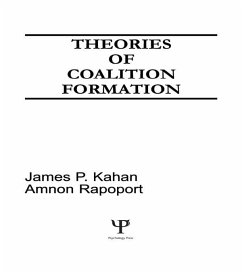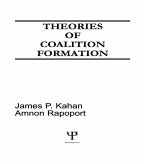First published in 1984. In this book, the authors set forth the central ideas and results of the major theories of coalition forming behavior. These theories address situations of partial conflict of interest with the following aspects: (1) there are three or more players, (2) players may openly communicate with each other, and (3) players form coalitions by freely negotiating agreements on how to disburse the gains that result from the coalition members' joint coordinated efforts. These models arise from the two disciplines of mathematics, in the theory of cooperative n-person games with side payments, and social psychology, in theories of small group behavior in mixed-motive situations. The goal is to explore the various solution concepts that make up this body of theory, and in particular to examine the psychological premises that underlie the various theoretical models.
Dieser Download kann aus rechtlichen Gründen nur mit Rechnungsadresse in A, B, BG, CY, CZ, D, DK, EW, E, FIN, F, GR, HR, H, IRL, I, LT, L, LR, M, NL, PL, P, R, S, SLO, SK ausgeliefert werden.









